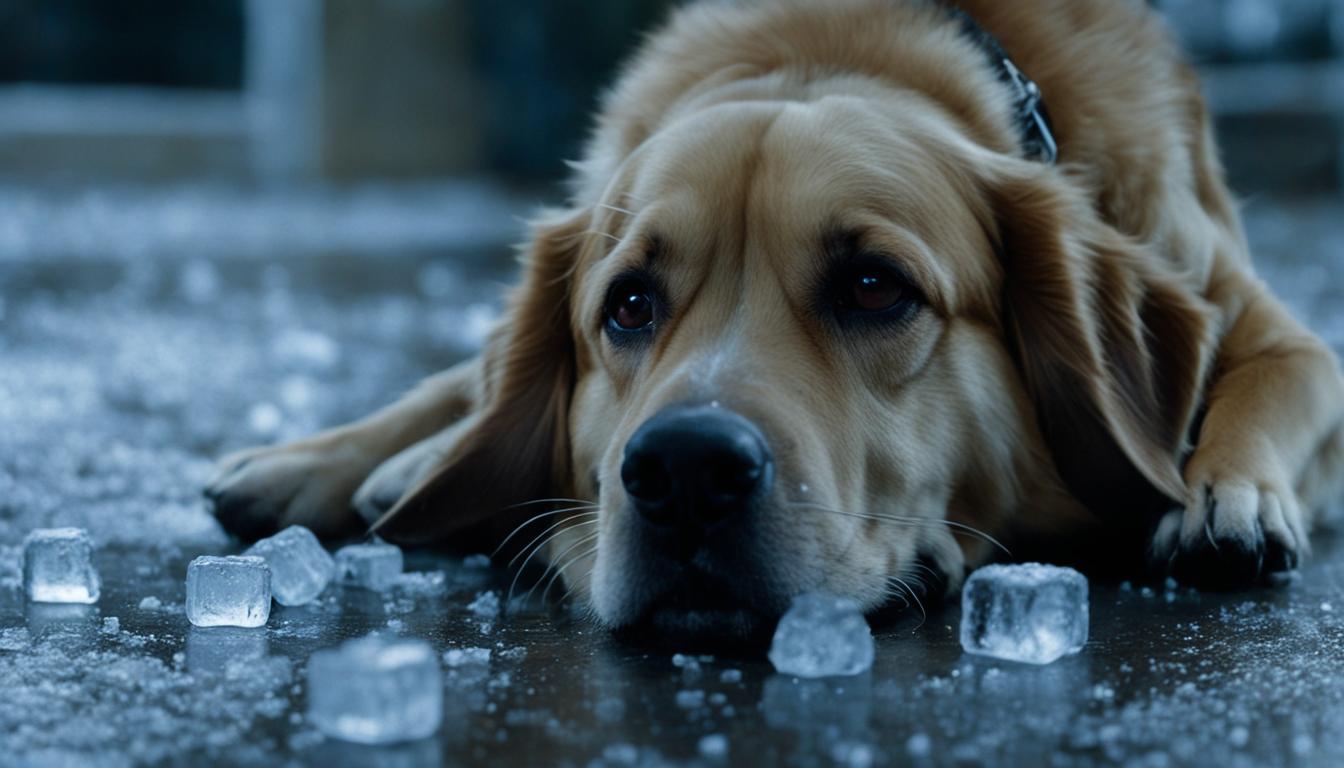Have you ever wondered why does my dog throw up after eating ice? It can be a concerning experience for pet owners. In this article, I will discuss the causes of dog vomiting after eating ice and provide some insights to help you better understand this phenomenon.
There are several reasons why dogs may vomit after consuming ice cubes or drinking ice-cold water. One common cause is when dogs swallow too much ice or cold water, which can lead to an overfilled stomach and subsequent vomiting.
Ingesting whole ice cubes can also pose a choking hazard for dogs. The act of swallowing the ice cubes without chewing them thoroughly can result in dogs dry-heaving, drooling, or even throwing up. Additionally, drinking ice water too quickly can cause the stomach to accumulate a large amount of liquid, leading to nausea and vomiting.
It's important to be cautious with the amount of ice given to dogs to prevent these issues. If your dog consistently vomits after eating ice, it may be a good idea to consult with a veterinarian to rule out any underlying health conditions.
Key Takeaways: Why Does My Dog Throw Up After Eating Ice
- Swallowing too much ice or cold water can lead to an overfilled stomach, causing dogs to vomit.
- Ingesting whole ice cubes can pose a choking hazard and result in dogs dry-heaving, drooling, or throwing up.
- Drinking ice water too quickly can cause nausea and vomiting due to the rapid accumulation of liquid in the stomach.
- It's important to consult with a veterinarian if your dog consistently vomits after eating ice to rule out any underlying health conditions.
- Monitor your dog's reactions and adjust their diet accordingly to avoid discomfort and vomiting.
Cold Shock in Dogs' Digestive System
Dogs, like humans, can experience a physiological response known as a cold shock when something extremely cold enters their bodies. When a dog consumes ice, the sudden temperature change in their relatively warm stomach can cause a gastrointestinal upset. This can trigger the vomiting reflex, leading to the dog throwing up. Not all dogs will have the same reaction to cold shock, and some may be more sensitive than others. It's important to monitor your dog's reactions and adjust their diet accordingly to avoid discomfort and vomiting.
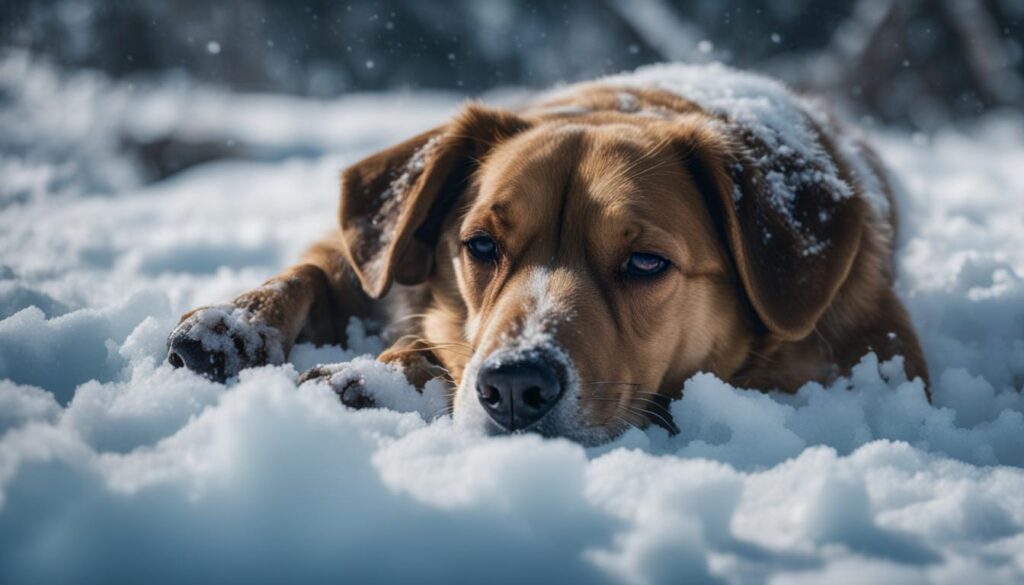

Some dogs may show immediate effects and vomit soon after consuming ice, while others may experience gastrointestinal upset and vomiting after some time. It's essential to observe your dog's behavior and consult with a veterinarian if you notice consistent patterns of vomiting due to cold shock.
Potential Symptoms of Cold Shock in Dogs:
- Vomiting
- Nausea
- Abdominal discomfort
- Diarrhea
- Loss of appetite
Excessive vomiting or persistent symptoms should be taken seriously and brought to the attention of a veterinarian. They can help determine if there are any underlying health conditions contributing to your dog's sensitivity to cold food or temperature changes.
It's crucial to remember that every dog is unique, and what may cause cold shock and vomiting in one dog may not affect another in the same way. Each dog's tolerance to cold food varies, so it's important to be vigilant and prioritize their well-being.
Rapid Ingestion of Ice
When dogs consume ice at a rapid pace, it can lead to an overfilled stomach, causing discomfort and vomiting. Similar to eating regular food too quickly, rapid ice consumption can overwhelm a dog's digestive system and result in regurgitation. Smaller dogs, with their smaller stomachs, are more susceptible to this issue. To prevent your dog from vomiting after eating ice too quickly, it is recommended to provide smaller amounts of ice or encourage slower consumption.
Allowing your dog to savor and enjoy the cool treat at a moderate pace can help prevent an overfilled stomach and minimize the likelihood of vomiting. By monitoring your dog's ice consumption and ensuring they don't gulp down large amounts all at once, you can help them avoid discomfort and potential digestive issues.
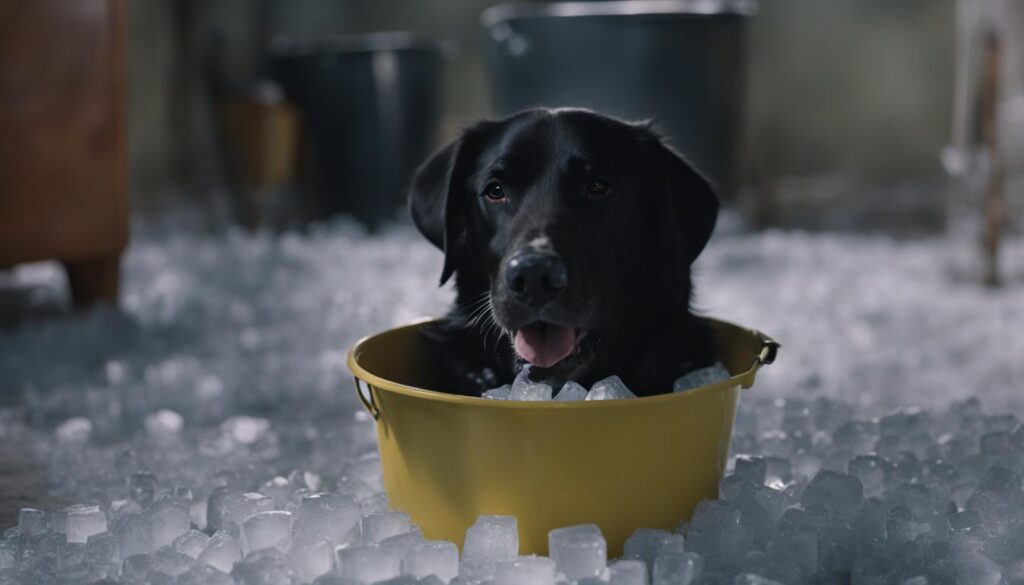

“I noticed that my dog tends to throw up after eating ice too quickly. It seems like he's just so excited to cool down that he forgets to take it slow. Now, I make sure to give him smaller pieces of ice and distribute them throughout the day. This way, he can still enjoy the refreshing treat without any digestive issues.” – Dog Owner
Choking Hazard
Dogs consuming ice cubes can face a choking hazard, especially smaller breeds and puppies. This risk arises because dogs often swallow ice without thoroughly chewing it, leaving the possibility of a piece becoming lodged in their throat. The obstruction can cause discomfort and trigger a choking reflex, resulting in coughing, gagging, and vomiting. Additionally, large ice cubes can chip a dog's teeth, particularly for smaller dogs and young puppies. To mitigate the choking risk and avoid potential tooth damage, it is recommended to give dogs crushed ice or small ice chips instead of large cubes. Always supervise your furry friends while they enjoy this chilly treat!
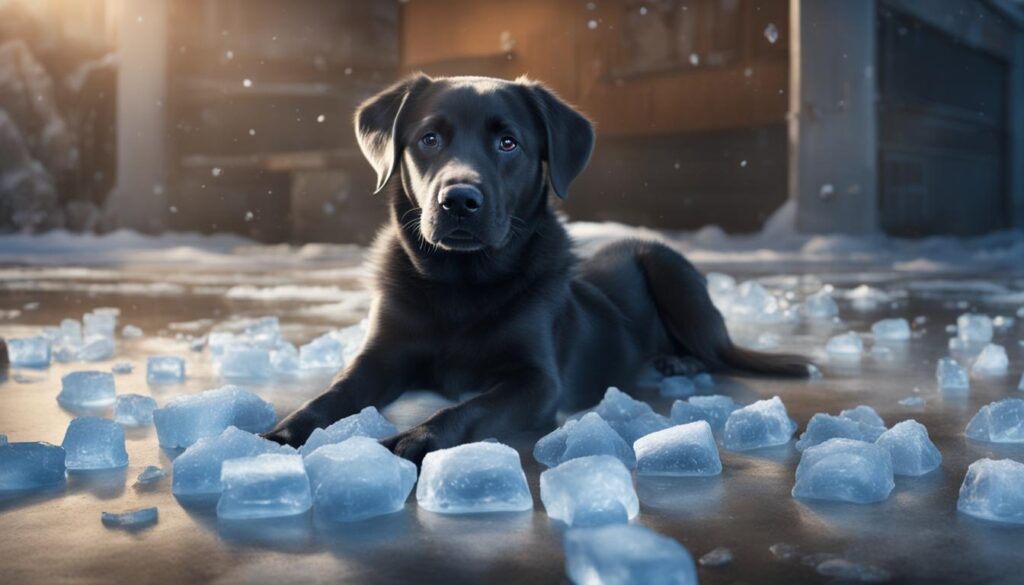

Note: Always supervise your dog when giving them ice, as it can pose a choking hazard and cause discomfort.
Hidden Health Issues
Dogs that consistently vomit after consuming ice may have underlying health conditions that make them more sensitive to cold food or temperature changes. Conditions such as gastritis or pancreatitis can cause a dog's digestive system to be more sensitive, leading to discomfort, pain, and vomiting after eating ice. Additionally, dogs with dental issues may experience pain when eating ice, resulting in nausea and subsequent vomiting. It's important to consult with a veterinarian if your dog frequently vomits after eating ice to rule out any hidden health issues.
Ensuring your dog's overall health is crucial to preventing vomiting after consuming ice. Regular check-ups with a veterinarian can help diagnose and manage underlying health conditions. Your vet may recommend dietary changes or prescribe medication to alleviate gastrointestinal discomfort and reduce vomiting episodes. Additionally, maintaining good oral hygiene and addressing dental issues promptly can minimize the chances of dental-related vomiting.
Common Underlying Health Issues Contributing to Vomiting after Eating Ice:
| Health Condition | Description |
|---|---|
| Gastritis | A condition characterized by inflammation of the stomach lining. It can cause nausea, vomiting, and abdominal pain. |
| Pancreatitis | An inflammation of the pancreas that can disrupt digestion and lead to abdominal pain, vomiting, and loss of appetite. |
| Dental issues | Problems such as tooth decay, gum disease, or oral infections can cause pain and discomfort when eating, leading to vomiting. |
Understanding and addressing these underlying health issues can help improve your dog's quality of life and reduce the occurrence of vomiting after consuming ice. Proper diagnosis and treatment by a veterinarian are essential for managing these conditions effectively.
In the next section, we will explore the possibility of allergic reactions to ice in dogs and discuss ways to prevent vomiting from consuming ice.
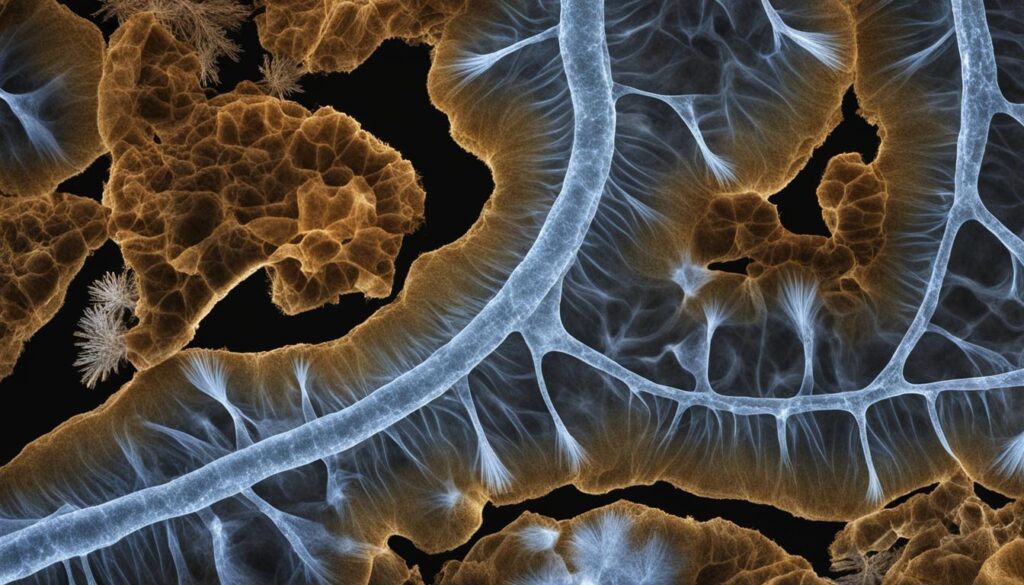

Allergic Reaction
While rare, some dogs may experience an allergic reaction to ice or the impurities present in the water used to make it. Hypersensitivity to substances like chlorine or copper found in tap water can cause dogs to have an allergic reaction and potentially vomit. Flavored or enhanced water used for making ice may also contain ingredients that dogs are allergic to. It's essential to pay attention to any unusual symptoms in your dog after consuming ice and seek veterinary advice to determine if an allergic reaction is the cause.
| Allergic Reactions to Ice in Dogs | Impurities Causing Allergies in Dogs |
|---|---|
|
|
Conclusion
To prevent dog vomiting from eating ice, several alternatives can help keep your furry friend cool and comfortable. Instead of giving your dog ice treats, consider frozen treats specifically designed for dogs or provide them with chilled food. These options can help avoid the risk of vomiting while still keeping your dog refreshed.
Another way to cool down dogs safely is by providing them with cool toys or allowing them to play in a shallow kiddie pool. These activities can help lower their body temperature without causing gastric distress.
Remember to monitor your dog's hydration levels during hot weather. Ensure they have access to fresh water and provide shaded areas for rest. If your dog consistently vomits after consuming ice or shows signs of distress, it's essential to consult with a veterinarian. They can rule out any underlying health conditions and provide guidance specific to your dog's needs. Always prioritize your dog's health and well-being by seeking professional help when needed.
FAQ
Why does my dog throw up after eating ice?
Dogs may vomit after consuming ice due to various reasons, such as cold shock, rapid ingestion, choking hazards, underlying health conditions, or possible allergic reactions.
What is cold shock in dogs' digestive system?
Cold shock refers to a physiological response in dogs when something extremely cold enters their warm stomach, causing gastrointestinal upset and potentially leading to vomiting.
Why does my dog vomit from eating ice too quickly?
Eating ice rapidly can result in an overfilled stomach, causing discomfort and vomiting. Smaller dogs may be more susceptible to this issue due to their smaller stomachs.
How can ice pose a choking hazard to dogs?
Dogs can choke on ice, especially if they swallow whole ice cubes without chewing them thoroughly. Using crushed ice or small ice chips is safer to prevent choking incidents.
Can hidden health issues cause dogs to vomit after eating ice?
Yes, underlying health conditions like gastritis, pancreatitis, or dental issues can make dogs more sensitive to cold food, resulting in discomfort, pain, and subsequent vomiting after consuming ice.
Can dogs have an allergic reaction to ice?
It is rare but possible for dogs to have an allergic reaction to impurities in ice or substances present in the water used to make the ice. Allergic reactions can lead to vomiting and other symptoms.
How can I prevent dog vomiting from eating ice?
To prevent dog vomiting after consuming ice, consider alternatives like frozen treats designed for dogs, chilled food, or allowing them to play in a shallow pool. Always monitor your dog's hydration and provide access to shaded areas in hot weather. Consult with a veterinarian if the vomiting persists or causes concern.

